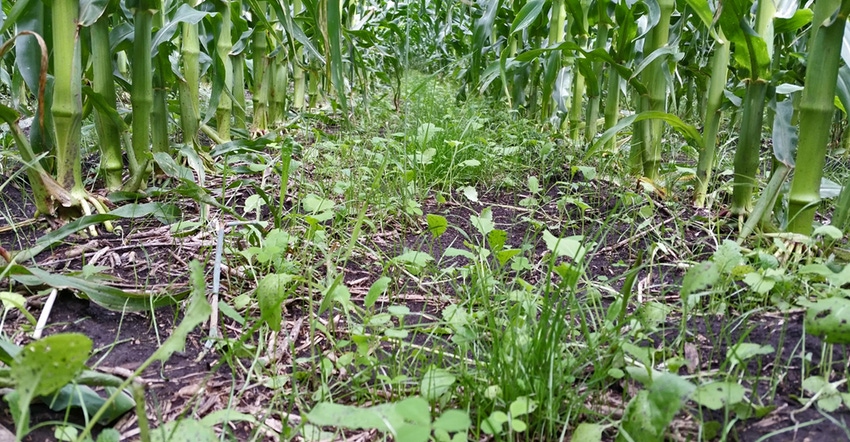October 27, 2017

Advocate for soil saving
Dear Editor,
Thank you for two very good articles in the October issue of the The Farmer magazine. One was by Walt Davis, “We’ve been plowing away our lives” [Beef Producer insert, Page 5]. I agree 100%. My renters have strip-tilled and no-tilled for years, and my soils have been improving every year.
This last spring, I did some tiling. When the tiler went to put the trenches in with his trenching machine, when he started digging he couldn’t believe how mellow the soil was. The machine didn’t jump or shake. The more lines he dug, the more he was convinced that I had unique soil. He said all of the tiling he had been doing previously, the machine had to work hard, and shook and jumped. The soil was so mellow it just started to fall into the trench right behind the tiling machine where the tile had been placed.
I have been an advocate of soil saving all of my life. The farm I’m on, when my father got it, the man that owned it before had raised wheat for World War I because it was a good paying crop. He kept on into the 1920s, raising wheat, burning the straw and plowing the ground in the fall, exposing it to wind and rain erosion.
When my father got the farm, it wouldn’t even raise a good crop of wild oats. Having a lot of livestock and using a lot of sweet clover and alfalfa, he built the farm up. Then in 1942, he started using fertilizer. Now if the old original owner could come back, he wouldn’t recognize the farm. There are grassed waterways where there had been gullies, and the hills are getting black again. The renters are taking 200- to 235-bushel-per-acre corn off this farm.
I also agree with Eric Fuchs, “There’s a simple fix for our land and the climate” [Beef Producer insert, Page 9]. Thirty-four years ago, everyone had livestock, so there was lots of cover on the ground from alfalfa and small grains. This protected the soil and stopped the sun from heaving up black soil. I agree, let’s start covering up the soil. Use cover crops in soybeans and corn. It serves two purposes: It helps keep the earth cooler and it preserves the soil from erosion.
Milferd Smith,
Darwin
High Renewable Fuel Standard crucial to help farmers, climate
By now, it’s obvious that the farm economic crisis is largely caused by an oversupply of corn and soybeans with not enough demand. Meanwhile, climate change looms large over the United States — one of the symptoms being destructive hurricanes that damage oil refineries in Texas.

GARY WERTISH

We can look to previous farm depressions for advice. In the past, renewable fuels have been key in raising producers out of tough times. This is why it makes no sense that the U.S. Environmental Protection Agency has announced lower proposed renewable fuel volume obligations under the Renewable Fuel Standard. Corn growers sell millions of bushels of corn to ethanol plants every year. Soybean growers need more opportunities to market their products, like biodiesel. The U.S. needs to reduce its dependence on fossil fuels.
President Donald Trump has said on multiple occasions that he wants to grow the ethanol industry. That’s a good promise to keep. But his energy secretary, Rick Perry, asked the EPA to waive half the conventional renewable fuel quota as Texas governor in 2008, according to a Bloomberg News story. His EPA administrator, Scott Pruitt, is the leader of the agency that seems to be working against the interests of U.S. farmers and the environment.
EPA has released a Notice of Data Availability, inviting public comments on “potential options for reductions in the 2018 biomass-based diesel, advanced biofuel and total renewable fuel volumes, and/or the 2019 biomass-based diesel volume under the RFS program.” The notice includes suggestions of reducing biomass-based diesel by 315 million gallons. This would drop the total Renewable Volume Obligation, which includes conventional ethanol, to 18.77 billion gallons from 19.24 billion gallons.
The good news is that there’s nothing mentioned about changing the Trump administration’s call for 15 billion gallons of availability for conventional biofuel, which is typically corn ethanol. However, the fact that EPA is considering rolling back renewable fuels of any kind is still a concern. The RFS law is intended to expand markets for biofuels produced in the U.S. Plus, biofuels provide jobs for rural America and lower the cost of fuel for consumers.
Another piece of good news for Minnesota is the B20 mandate. Starting in spring 2018, diesel fuel sold here will be required to contain at least 20% biodiesel. That’s an increase from the current B10. The entire nation should be going this direction.
We need ethanol and other biofuels because they are grown in the United States, provide a boost to farmers and reduce our dependence on fossil fuels. Some of the biggest oil refineries in America were just hit hard by Hurricane Harvey and were shut down for weeks, driving gas prices up everywhere. Turning to more renewable fuels can ease that pain in the future.
Minnesota Farmers Union urges the EPA to increase biofuel volume requirements — not decrease them.
Gary Wertish, president,
Minnesota Farmers Union
You May Also Like




